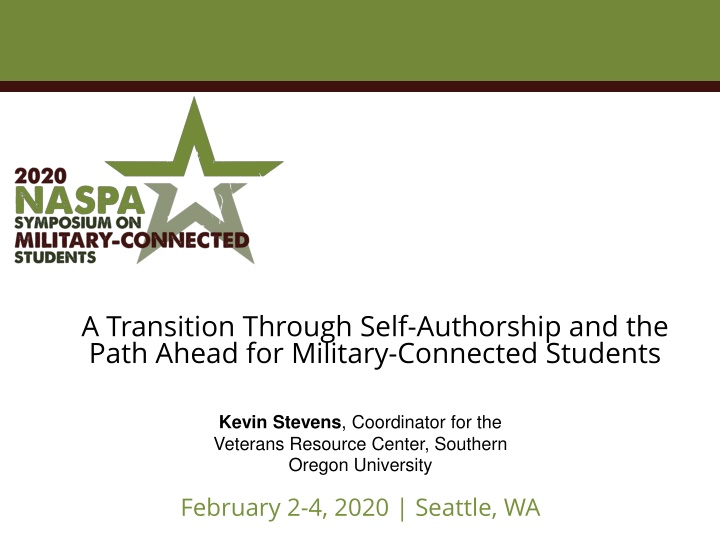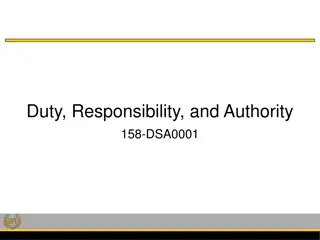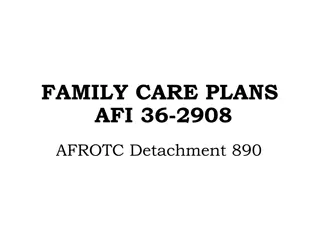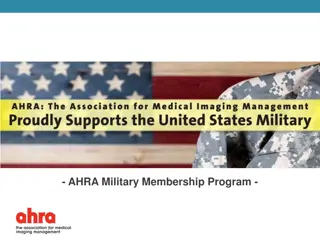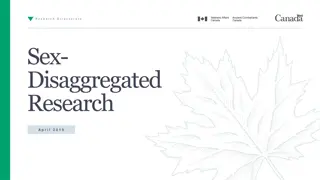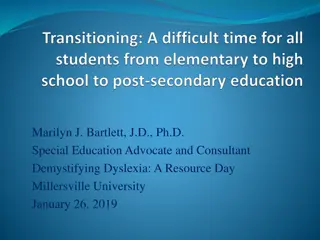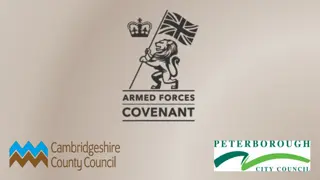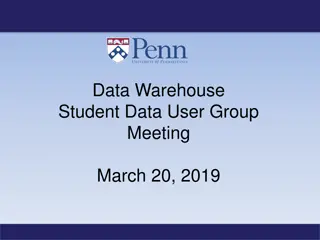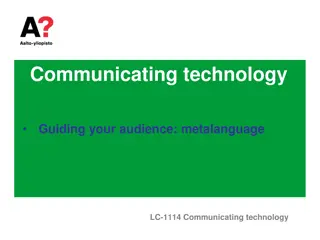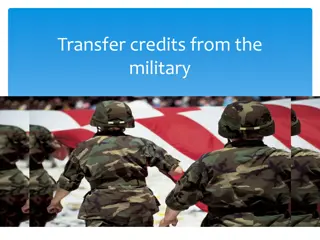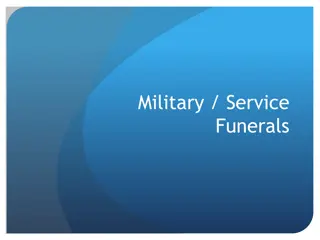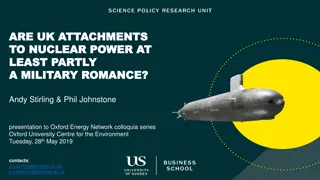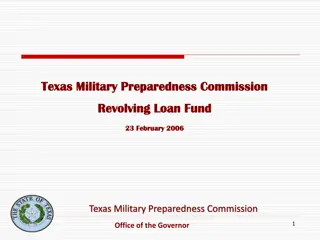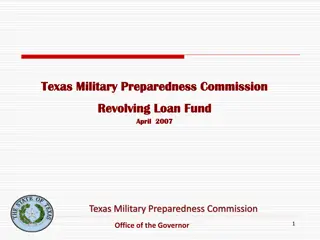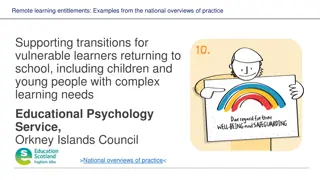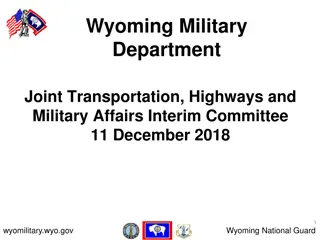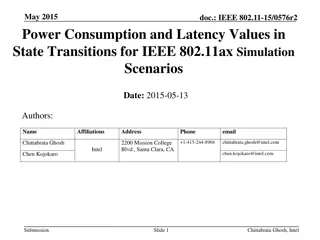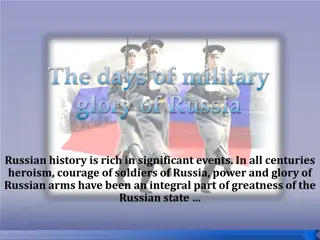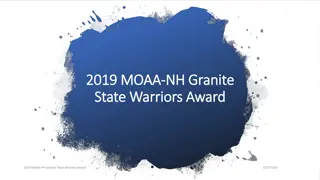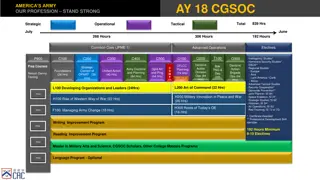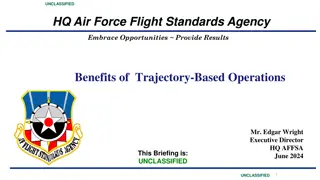Navigating Military Student Transitions
This presentation by Kevin Stevens explores ways to support military-connected students as they navigate their academic journey and find purpose. It delves into the concept of "Self-Authorship" and examines the challenges and paths taken by these students, aiming to enhance understanding and support for their unique needs.
Download Presentation

Please find below an Image/Link to download the presentation.
The content on the website is provided AS IS for your information and personal use only. It may not be sold, licensed, or shared on other websites without obtaining consent from the author.If you encounter any issues during the download, it is possible that the publisher has removed the file from their server.
You are allowed to download the files provided on this website for personal or commercial use, subject to the condition that they are used lawfully. All files are the property of their respective owners.
The content on the website is provided AS IS for your information and personal use only. It may not be sold, licensed, or shared on other websites without obtaining consent from the author.
E N D
Presentation Transcript
A Transition Through Self-Authorship and the Path Ahead for Military-Connected Students Kevin Stevens, Coordinator for the Veterans Resource Center, Southern Oregon University February 2-4, 2020 | Seattle, WA #SMCS20 @NASPAtweets
Abstract In this presentation, the presenter will look at methods to support students through decision making process as the work toward their degree. Through the lens of Authoring your life through "Self- Authorship" as drafted by Baxter Magolda (2009), the session will explore ways to support our Veterans and Military families find their purpose and place. Specifically, the presenter will look at the different paths that Military-connected student and associated students select, as well as ways to identify "Self- Authorship" as our students create their own journey. #SMCS20 @NASPAtweets
Presenter Kevin J. Stevens, M.A. USAF/ANG 2002-2010 Coordinator of the Veterans Resource at Southern Oregon University Doctoral Student (hybrid program) at Purdue University-West Lafayette Created the Veterans Services Office at Queensborough Community College in Queens, NYC Worked as a civilian education contractor at Al Udeid, Qatar Assistant Registrar-Veterans, Missouri State Director of Student Services-Bunker Hill Community College - Boston Past Board Member for NAVPA (Veterans Program Administrators) NASPA region V and Veterans Knowledge Community Representative Past presentations include LGBTQ Veterans and creating Veteran Friendly campuses #SMCS20 @NASPAtweets
Our Students Transition Reluctance to join campus organizations May head home after class (i.e. work, family, commute) Assimilation to the classroom, age difference, communication with professors 4-8 years away from writing a paper, working out a math problem Political polarization in the classroom Stigma or false perceptions of military service I feel so sorry for you and your students, they are so broken, were you a pilot? Up and down trend of Student Veterans Association involvement Campus leaders, integration of cultural experiences in the classroom, mentors, teachers, advocates #SMCS20 @NASPAtweets
General Ideas It will vary depending on campus size, culture, support, and the current level of your Veterans related programming What's the setup of your campus affiliated Veterans Offices? Two offices (A center & certifier separate) or (The One-Stop Shop), have you evaluated whether it is helping our students' transition? The Veterans space (lounge or center) has become a hub for our students, though engagement fluctuates with each year's student population Policy guidance, syllabus statements, cultural competency trainings, the use of vetted resources on campus and in the area Establishing connections with resources, Commanders Secretary #SMCS20 @NASPAtweets
Challenges/Issues Suicide, Anxiety, Depression, PTSD, TBI, physical health factors, VA service- connected claim process, homelessness, employment, and transition out of service Making the connection between military training and civilian college credit, whether evaluated by the college or the student s own advocacy Colleges that are not accredited pursuing a Veterans GI Bill, Organizations are pursuing numbers and are not prepared to help the Veteran #SMCS20 @NASPAtweets
Authoring Your Life Self- Authorship (Baxter Magolda, 2009) during transition, and as they form their own path, encouraging them to engage the process will be key in helping develop a sense of true self In the context of the challenges students face in and out of the classroom, Phases Listening to the Internal Voice Putting aside external noise Cultivating the Internal Voice Beginning to make decisions about goals/interests that are your own Trusting the Internal Voice Starting to take action Building an International Foundation Strengthening their goals, acting based on their new foundation Securing Internal Commitments Beginning to live out these goals (Baxter Magolda, 2009, p. 324) #SMCS20 @NASPAtweets
(Baxter Magolda, 2009) Contd Finding ways out of the perspectives or social aspects of military life, childhood, or other factors that have not aided our growth My family has always wanted me to I cannot work in art or humanities The student needs to be able to understand and positively accept their path, and even be willing to change and cultivate that perspective Which identity will your students default to and why, will they find themselves carrying all aspects of their military training with them into the classroom, will they revert to how they were before they entered the military, what has informed this and how to lead them onto the next path #SMCS20 @NASPAtweets
(Baxter Magolda, 2009) Contd Students can take steps towards forming their own ideas, trusting their own perspectives, engaging and learning from their college experience, helping them get to the point that they can be committed and secure who in they are Just because you were an MP, doesn't mean you have to work in Law Enforcement; or Flight Mechanic, or Firefighter...and so on We need to engage our students, not just send in their forms or register them, it is much harder to change your career goal once established in your chosen field, work with career resources, facilitate trainings with faculty and staff, collaborate with groups inside and outside of Veterans Services #SMCS20 @NASPAtweets
Closing Thoughts Engage your resources on and off campus (but vet them!) Open the door for your students through conversation, programming and collaboration Remember to ask questions, what might be guiding their current thought process, ask about their interests, connect programming with academic departments and career services, have they participated in campus events/programs/speakers Encourage your student to reach out to someone in their field of interest Remind students to talk with faculty during office hours regarding their interests Put your faculty and staff in a better position to assist students through military cultural competency trainings Be the voice of support, challenge your student, as they form their own purpose beyond societal, military, or family-based expectations that go against their goals (I changed my major 6 times as an Undergraduate) #SMCS20 @NASPAtweets
Resources & Questions? What resources do we have at our disposal? Each other, look around this room, or look around the conference session, here's my contact info if I can ever assist (Direct Line at SOU: 541-552-6710 or email stevensk3@sou.edu) Resources that have already been vetted such as the VA, DoD, State and County Veterans Services, Veterans Centers, DAV, etc. Lastly, what we learn at this and other conferences, it's hard to attend all sessions so select a few that you see helpful to your office/college Thank you for serving our Veterans and Military Families #SMCS20 @NASPAtweets
References Brown, P. A., & Gross, C. (2011). Serving those who have served managing veteran and military student best practices. The Journal of Continuing Higher Education, 59(1), 45-49. Magolda, M. B. (2009). Authoring Your Life: Developing Your INTERNAL VOICE to Navigate Life s Challenges. Sterling, Virginia: Stylus Publishing, LLC. Magolda, M.B. (2011). Ideas for a self-authorship curriculum for students with military experience. ASHE Higher Education Report, 37(3), 81-91. Sutton, H. (2016). Establish a home for veterans on your campus through community. Recruiting & Retaining Adult Learners, 18(7), 12-12. Wilson, K., & Smith, N. (2012). Understanding the importance of life mission when advising soldiers. New Directions for Adult and Continuing Education, 2012(136), 65- 75. #SMCS20 @NASPAtweets
